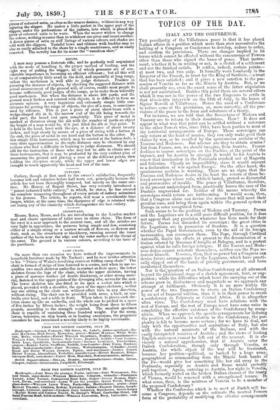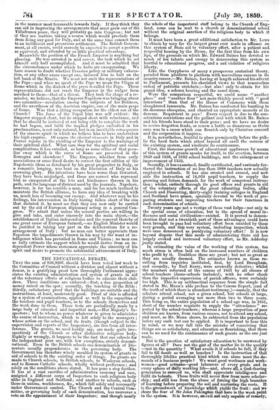TOPICS OF TUE DAY.
ITALY AND THE CONFERENCE.
THE peculiarity of the Villafranca peace is that it has placed Italian affairs in a position which more than ever necessitates the
holding of a Congress or Conference to develop, reduce to order, and confirm its provisions. There are changes implied in its terms which cannot be effected without the concurrence of Powers other than those who signed the bases of peace. That instru-
ment, whether it be in writing or not, is a sketch of a settlement and not the finished article. It settles, indeed, certain points—
at most two, and two only. It formally vests Lombardy in the Emperor of the French, in trust for the King of Sardinia,—a trust that has been satisfied ; and it gives a new sanction to the pos-
session of Venetia as far as the Mincio by Austria. But, as we shall presently see, even the exact sense of the latter stipulation is not yet ascertained. Besides this point there are several others which it was not in the power of the two Emperors to settle in that tete-a-tete interview on the 11th of July, in the house of Signor Morelli at Villafranca. Hence the need of a Conference to reduce some of the provisions, or, more correctly, all the pro- visions of the peace to the form and substance of a treaty.
For instance we are told that the Sovereigns of Modena and Tuscany are to return to their dominions. How? It does not appear in what way that point can be settled without a reference
to the other Powers who, since 1815, have been parties to most of the territorial arrangements of Europe. Those sovereigns can
only return at the head of armies, they can only make good their claims by war, or be recalled by the spontaneous acclaim of the Tuscaus and liodenese. But whence are they to obtain armies ?
Not from France, nor, we should imagine, from Austria. France
declines to impose sovereigns on the Duchies at the point of the bayonet, and for Austria to attempt it would be for Austria to renew that domination in the Peninsula crushed out at Magenta and Solferino. Clearly an impossibility, since it would amount to a declaration of war against Europe. On the other hand, the spontaneous acclaim is wanting. There are no signs that the Tuscans and Modenese desire in the least the return of those be- loved sovereigns whose rule, while it lasted, proved so distasteful and provocative of trouble. The peace of Villafranoa, therefore, in its present undeveloped form practically leaves the case of the Duchies unprovided for. Neither of the means whereby the sovereigns could return are forthcoming. It would seem, then, that a Congress alone can devise the means that will meet their peculiar case, and bring them again within the general system of Europe in some recognized form. Such seems to be the in of Modena and Tuscany. Parma and the Legations are m a still more difficult position, for it does not appear that any provision whatever has been made for their future. Parma has discarded its sovereign; the great cities in the Legations are in possession of freedom. It is a question whether the Papal Government, even by the aid of its foreign mercenaries, can reconquer them. The Pope, through Cardinal Antonelli, limits his efforts at present to the denunciation of a truism uttered by Massimo d'Azeglio at Bologna, and to a protest against what he calls foreign intrigue. If the Tuscan and Mode- nese dukes cannot reinstate themselves, neither can the Pope re-
instate himself. It seems, then, that no power but a Congress can devise future arrangements for the Legations, which have practi- cally, slipped out of the hands of priestly government, and have secularized themselves.
Nor is the: question of an Italian Confederacy at all advanced. beyond the provisional stage of a sketch agreement, hint, OT sug-
gestion; while the difficulties which beset the carrying out of the scheme grow in distinctness and magnitude as we approach any attempt at fulfilment. Obviously it is no more within the power of the two Emperors to create an Italian Confederacy by an act of Imperial volition, than it is in their power to create a confederacy in Polynesia or Central Africa. It is altogether ultra vires. The Confederacy must have relations with the rest of Europe, and the rest of Europe mast have some voice in completing the effective existence of the Confederacy by recog- nition. When we approach the specific arrangements for defining the position of Austria in relation to the Confederacy, the per- plexity is felt to become more serious; for we have to deal, not only with the opportunities and aspirations of Italy, but also with the natural mistrusts of the Italians, and with the easily interpreted reserves of Austria ; and the views of leading English statesmen cannot be left out of the account. It is ob- viously a natural apprehension, that if Austria enter the Italian Confederation, though only through Venetia, as Austria, the whole object of the war will be frustrated, because her position—political, as backed by a huge army, geographical as commanding from the Mincio both banks of the Po—would give her something like her old sway in the Peninsula especially as Austria and Rome would probably pull together. Again, entering as Austria, her right to 'Venetia, which formerly rested on the broken Italian clauses of the treaty of Vienna, would be renewed with a strengthened tenure. In what sense then is the mistress of Venetia to be a member of the proposed C Confederacy?
Whether the Conference which is to meet at Zurich will be- come a Congress depends on the estimate the neutral Powers form of the probability of modifying the ulterior arrangements in the manner most favourable towards Italy. If they think they can aid in improving the arrangements that must grow out of the Villafranca peace, they will probably go into Congress ; but not if they see matters taking a course which would preclude them from doing any good for Italy, and at the same time commit them to an indifferent and precarious settlement. The British Govern- ment, at all events, could scarcely be expected to accept a position so equivocal, and attended by so little practical advantage. Meanwhile the position of the French Emperor is anything but pleasing. He was arrested in mid career, the task which he set himself only half accomplished. And it must be admitted that the circumstances under which he halts are exasperating. We have reason to doubt whether Prussian policy or military exhaus- tion, or any other cause except one, induced him to halt on the left bank of the Mincio. We must not omit the representations of the Pope—and when we speak of the Pope we mean the Clique at Rome which in the dialect of the press is called the Pope. Those representations did not reach the Emperor in the vulgar form ascribed to them—that of a threat. They took the shape of a re- minder, we believe, that the Emperor Napoleon was bringing about two calamities—revolution among the subjects of his Holiness, and the overthrow of the Austrian empire, one of the main props of Rome. Was that a fitting occupation for the eldest son of the Church ? The force of the Papal hint was self evident : the Emperor stopped short, but he stopped short with reluctance, and that he should be irritated at not being able to complete the work he had begun, and fulfil the implied pledges embodied in his proclamations, is not only natural, but is an inevitable consequence of the sincere spirit in which we believe him to have undertaken his high emprise. Of course the clerical elements in Italy and in France rejoice in the yielding of the Emperor to the warnings of their spiritual chief. What care they for the spiritual and social complications it has entailed, so long as some relics of that pecu- liar sway which is the curse of Rome are preserved in the Romagna and elsewhere ? The Emperor, whether from early associations or some fixed desire to correct the first edition of the Napoleonic ideas as developed by his great progenitor in Italy, or a romantic longing, was bent on the liberation of Italy as his crowning glory. His intentions have been worse than thwarted, they have been misjudged, and those are correct who represent him as exasperated at the lets and hindrances thrown in his path, and the language of distrust used by the journals. Napoleon, however, is far too sensible a man, and. far too much inclined to maintain the British alliance, to have any idea of breaking with us, much less of becoming our enemy. And whatever may be his feelings, his intervention in Italy having fallen short of the aim that dictated it, he must see that they can now only be carried out by the aid of European diplomacy acting in a general Con- gress. We admit that unless the several parties are willing to give and take, and enter sincerely into the main object,—the establishment of Italian independence and the removal thereby of one great cause of European turmoil,—no English Minister would be justified in taking any part in the deliberations for a re- arrangement of Italy ; but no man can better appreciate than Napoleon the impediments thrown in his way by the want of in- telligence which has prevailed in Rome and Vienna; no man can so fully estimate the support which he would derive from an in- dependent Power whose statesmen appreciate the sincerity of his spirit and desire to promote the substantial advancement of Italy.



























 Previous page
Previous page